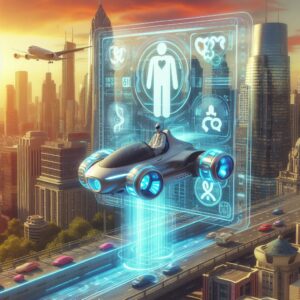Advancements in technology have revolutionized various industries, and healthcare is no exception. Artificial Intelligence (AI) is transforming the way patient care is delivered, leading to improved outcomes and enhanced efficiency. From diagnosis to treatment, AI is playing a crucial role in revolutionizing healthcare. 💊 💉 🩺
Enhanced Diagnosis
One of the key areas where AI is making a significant impact is in the field of diagnosis. AI-powered algorithms can analyze vast amounts of patient data, including medical records, lab results, and imaging scans, to assist healthcare professionals in making accurate and timely diagnoses. By leveraging machine learning and pattern recognition, AI systems can identify patterns and anomalies that may be missed by human clinicians, leading to more precise and early detection of diseases. 6 free courses to master Generative AI from Microsoft, Google, Harvard, and more
Personalized Treatment Plans
AI is also enabling the development of personalized treatment plans for patients. By analyzing patient data, including genetic information, medical history, and treatment outcomes, AI algorithms can identify the most effective treatment options for individual patients. This personalized approach not only improves patient outcomes but also reduces the risk of adverse reactions to medications and unnecessary procedures.

Remote Patient Monitoring
With the help of AI, remote patient monitoring has become more accessible and efficient. AI-powered devices can collect and analyze patient data in real-time, allowing healthcare professionals to remotely monitor patients’ vital signs, medication adherence, and overall health status. This technology is particularly beneficial for patients with chronic conditions who require continuous monitoring, as it enables early intervention and reduces the need for hospital visits.
Predictive Analytics
AI algorithms can analyze large datasets to identify patterns and predict future outcomes. In healthcare, this capability is being used to predict disease outbreaks, identify patients at risk of developing certain conditions, and optimize resource allocation in healthcare facilities. By leveraging predictive analytics, healthcare providers can take proactive measures to prevent diseases, allocate resources effectively, and improve overall population health. 💊 AI and the Future Workforce: Job Trends and Transformations
Surgical Assistance
AI is also transforming the field of surgery by providing surgeons with real-time assistance and guidance. Robotic surgical systems powered by AI can enhance surgical precision, reduce the risk of errors, and improve patient safety. These systems can analyze real-time data from imaging scans and provide surgeons with augmented reality overlays, allowing them to visualize critical structures and make more informed decisions during surgery. 6 cool smart glasses launched by big tech giants in 2023
Drug Discovery and Development
Developing new drugs is a complex and time-consuming process. AI is helping to accelerate drug discovery and development by analyzing vast amounts of data to identify potential drug candidates and predict their efficacy. AI algorithms can analyze molecular structures, genetic information, and clinical trial data to identify promising drug targets and optimize drug formulations. This not only speeds up the drug development process but also increases the chances of success in clinical trials.
Patient Engagement and Education
AI-powered chatbots and virtual assistants are transforming patient engagement and education. These tools can provide patients with personalized health information, answer their questions, and remind them to take medications or attend appointments. By empowering patients with access to reliable information and support, AI is enabling them to take a more active role in their own healthcare, leading to improved health outcomes.
Conclusion
The integration of AI into healthcare is revolutionizing patient care. From enhanced diagnosis to personalized treatment plans, AI is improving patient outcomes and transforming the way healthcare is delivered. As technology continues to advance, we can expect AI to play an even more significant role in shaping the future of healthcare.

